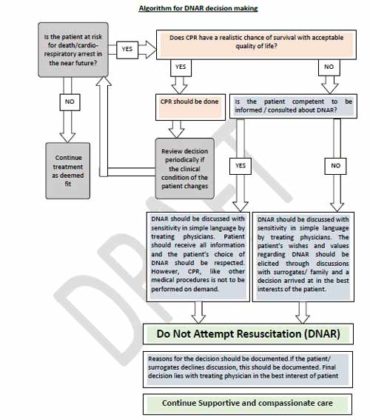- Home
- Editorial
- News
- Practice Guidelines
- Anesthesiology Guidelines
- Cancer Guidelines
- Cardiac Sciences Guidelines
- Critical Care Guidelines
- Dentistry Guidelines
- Dermatology Guidelines
- Diabetes and Endo Guidelines
- Diagnostics Guidelines
- ENT Guidelines
- Featured Practice Guidelines
- Gastroenterology Guidelines
- Geriatrics Guidelines
- Medicine Guidelines
- Nephrology Guidelines
- Neurosciences Guidelines
- Obs and Gynae Guidelines
- Ophthalmology Guidelines
- Orthopaedics Guidelines
- Paediatrics Guidelines
- Psychiatry Guidelines
- Pulmonology Guidelines
- Radiology Guidelines
- Surgery Guidelines
- Urology Guidelines
Key takeaways from ICMR draft guideline on 'Do Not Attempt Resuscitation'

India: The Indian Council of Medical Research (ICMR) has drafted a position paper on 'Do Not Attempt Resuscitation (DNAR)' with the help of a multi-disciplinary team of experts, which would guide treating physicians to make the decision whether or not to perform the Cardiopulmonary Resuscitation (CPR) on the background of incurable disease where the patient's chances of survival are extremely low.
CPR is an emergency procedure performed to save the life of patients suffering from cardiac and/or respiratory arrest. A cardio-respiratory arrest may occur in an otherwise healthy individual outside the hospital due to a sudden illness such as ventricular tachycardia that requires immediate CPR. In cases, where death is inevitable such as when cardio-respiratory arrest develops in hospitalized patients as a consequence of their primary disease, providing CPR may only increase the suffering of the patients.
The purpose of the DRAFT document is to help and guide treating physician(s) about their decision on 'Do Not Attempt Resuscitation' (DNAR). The intention is not to prolong the patient's suffering and to preserve dignity in death by avoiding medically non-beneficial CPR while providing compassionate care. It is to preserve the mutual trust and respect between the treating physician (s) and patient/ surrogates.
The draft applies to the patients with an incurable disease where CPR is inappropriate, non-beneficial and will only prolong the suffering of the patient. It is intended to facilitate the process of informed decision making about CPR and DNAR by the treating physician on a case to case basis
The position paper will be finalized for release based on the inputs from the national consultation. The draft, although not finalized yet, contains some salient features mentioned below
DETAILED INSTRUCTIONS
Procedure:
- The treating physician(s) should initiate discussions with the patient/ surrogate and explain in detail the patient's disease and its prognosis, and the benefits and harms of CPR in the given case.
- There should be an adequate opportunity, time, and space to communicate with the patient and family in private to discuss and facilitate a clear understanding of DNAR and its implications.
- All such discussions must be noted in the patient's case records and the DNAR form.
- Healthcare professionals should communicate the following while making the DNAR decision that the patient would continue to be provided with all treatments intended for potentially curable comorbid conditions or to reverse potentially reversible conditions or to provide comfort. DNAR does not automatically mean withdrawal or withholding of other life-supporting treatments.
- DNAR forms in the language understood by the patient/surrogate(s) should be signed, timed and dated by patient/surrogate(s) and the treating physician. In the case of patient/surrogate(s) does/do not sign the DNAR form, the same should be recorded.
 Image Source: ICMR DRAFT consultation on DNAR
Image Source: ICMR DRAFT consultation on DNAR
Decision and Review of DNAR orders:
- The final decision regarding DNAR where CPR is deemed medically inappropriate rests with the treating physician(s) responsible for the patients' care after informing the patient/surrogates.
- The DNAR decision should be subjected to review at regular intervals by the treating physician(s).
- Hospital administration should make efforts to sensitize the healthcare professionals on all issues related to DNAR.
- Teamwork and good communication are of crucial importance in decision-making and the delivery of care. Having in place a small team consisting of treating doctors, nursing personnel, a psychologist or social worker could be useful for preparing the patient and family and providing supportive compassionate care.
Storage of DNAR forms:
- The resuscitation plans and completed DNAR forms should be easily accessible to all the medical professionals to respond appropriately in the event of cardiorespiratory arrest.
- It is recommended to attach a copy of the DNAR form to the patient's case records and to be integrated with the electronic health records, if available.
- All the case reports along with the DNAR forms should be archived for future reference.

Disclaimer: This site is primarily intended for healthcare professionals. Any content/information on this website does not replace the advice of medical and/or health professionals and should not be construed as medical/diagnostic advice/endorsement or prescription. Use of this site is subject to our terms of use, privacy policy, advertisement policy. © 2020 Minerva Medical Treatment Pvt Ltd